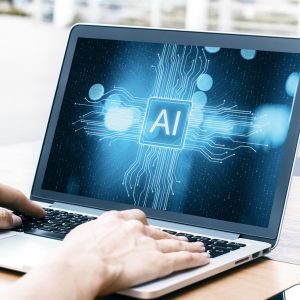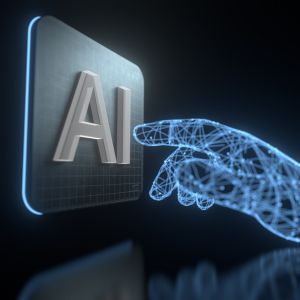The impact of artificial intelligence on digital training.
- How does AI personalize the learner experience ?
- What AI-based tools optimize digital training ?
- What limitations does AI still need to overcome in this field ?
- What opportunities does AI offer to training companies ?
How does AI personalize the learner experience ?

One of AI’s greatest strengths in digital training is personalization. Thanks to advanced algorithms, learning platforms automatically adapt content to meet each learner’s individual needs.
- Concrete example: AI-powered tools like intelligent chatbots can identify knowledge gaps and suggest appropriate learning modules.
Key benefit: This individualized approach enhances knowledge retention and boosts learner motivation.
Which AI-based tools optimize digital training ?
Many innovative tools enhance digital training through the power of AI:
-
Virtual assistants: They answer learners’ questions in real time, providing instant support and guidance throughout the training process.
-
Speech and text recognition: These technologies allow for simplified navigation and more natural interactions with the platform, improving accessibility and user experience.
-
Predictive learning platforms: They analyze learners’ data to forecast performance and recommend personalized learning paths or interventions.
By integrating these technologies, trainers save valuable time and can focus on high-value tasks such as mentoring, course design, or learner engagement.
What limitations must AI still overcome in digital training ?
Despite its many advantages, AI faces several challenges in the field of digital learning:
-
Ethical concerns: The use of personal data raises issues around privacy and security. Ensuring responsible data handling is essential to maintain trust.
-
Technological dependence: Overreliance on AI can reduce meaningful human interaction, which remains a vital component of effective learning.
-
High costs: Implementing advanced AI solutions can be expensive, especially for smaller training organizations or institutions with limited budgets.
These limitations highlight the need to strike a balance between technological innovation and human involvement to ensure truly effective and ethical learning experiences.
What opportunities does AI offer to training organizations ?

Training organizations leverage AI to stay competitive and attractive.
-
Automation of repetitive tasks: AI streamlines administrative processes such as enrollment management, learner progress tracking, and certification.
-
Access to global training: AI-powered platforms enable 24/7 learning, making education accessible anytime and anywhere.
-
Enhanced learning materials: AI generates engaging visual and interactive content, enriching the learning experience.
Integrating these tools is becoming essential to meet the expectations of modern learners and to maintain relevance in a rapidly evolving digital landscape.
Conclusion
In summary, artificial intelligence is profoundly transforming digital learning, offering unique opportunities to enhance education. However, while its benefits are undeniable, it is crucial to maintain a balance between technological innovation and human considerations. Furthermore, the adoption of AI requires a thoughtful approach, particularly to address challenges related to ethics and accessibility.
Additionally, this technological revolution should not be seen as just a tool but as a strategic lever for training organizations. By combining the strengths of AI with human expertise, it becomes possible to design truly engaging learning experiences tailored to individual needs. Finally, by integrating these technologies wisely, training companies can position themselves to effectively meet the demands of a constantly evolving world.
1. What is AI in digital training ?
2. What are the benefits of AI for trainers ?
3. Can AI replace human trainers ?

























